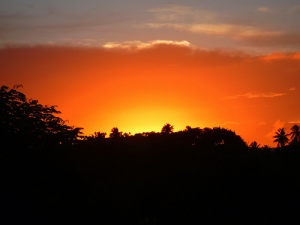
The island nation of Samoa wants to improve its trade relations with Australia, New Zealand and China. As such, it is getting set to lose a day in order to align its time zone with its trade partners. Tomorrow, on what should have been Friday the 30th of December in Samoa, time on this island will jump ahead to Saturday the 31st of December.
I want to explore this shift in time in Samoa through the broader lens of the sociology of time. The theory of social construction states that the things that we take for granted as ordinary, mundane or commonsense are actually social ideas shaped by culture. The idea of temporal time is measured through our watches, calendars and other scientific instruments and technologies. As such, the passing of time is perceived as an unremarkable fact of life. The social meaning of time in different cultures varies. The idea of time as a fixed entity is actually a social illusion. I will show how history, social forces and life situations shape our ideas about time. I include a case study of ‘island time’ to show the variability of how time is understood and valued in island nations such as Samoa and Gabriola Island in British Columbia, Canada. I use the impending time change in Samoa to introduce the idea of ‘social time’, which is a useful way to understand how people in different cultures organise and think about time.
